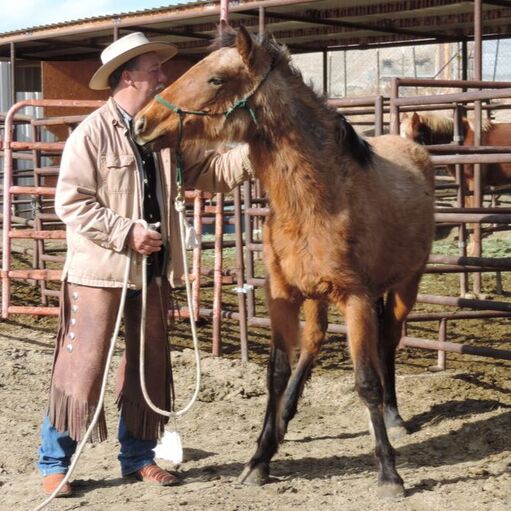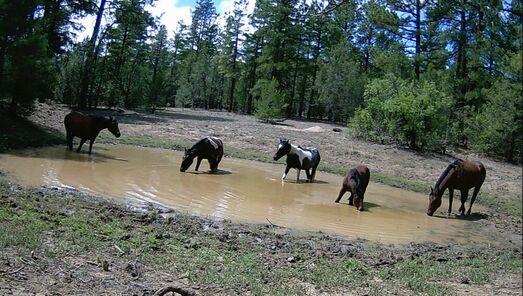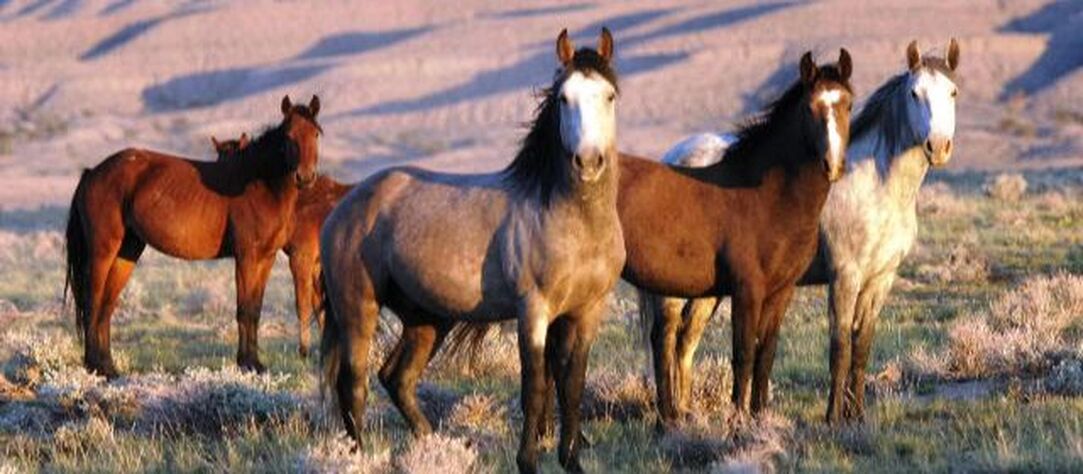JMHA's Change of Focus
Why Keep the Mustangs Wild?
|
When JMHA first began our work of helping mustangs, we focused all our efforts on the objective of finding good adoptive homes, and preparing the horses for domestic life. It didn't take us long to realize that, for a number of reasons, placing mustangs in good homes was going to be far more challenging than we first expected. The foremost problem is, the number of horses being removed from the range far out pace the number of people looking to adopt a mustang.
The next big challenge we discovered lay in the people who want to adopt. Many who come with the dream of taming a wild horse are sadly unprepared for what the reality of gaining a wild horse's trust involves. Even people with decades of horse experience can be out of their depth when dealing with the extreme fear and instinct for survival that can come packaged with a wild mustang. It takes an enormous amount of time to overcome many of the wild tendencies mustangs have. Those who are truly committed to making the adoption work will pursue help in training, but they are often dismayed by the length of time this can take, and training cost of preparing a mustang for basic handling. Which generally doesn't even get the horse the stage where saddle training can begin. Other financial considerations can unexpectedly crop up and pose difficulties, causing adoptions to fall through. |
JMHA takes time to get to know the adopters and tries to pair them with the best horse partner we can. Unfortunately, the government agencies in charge of mustang gathering and adoptions do not invest much time into trying to find the right placement for each horse. It has been the tragic case, some choose to adopt a mustang solely for the reason that the adoption fee is so low. People who adopt because they want a "cheap horse" usually find out very quickly they can not afford the costs encompassed in the basic care of horse ownership. The lack of any real screening on the part of governmental authorities has lead to several mustangs being placed in the hands of novice, or sometimes even first-time horse owners. This leads to a dangerous situation for both the horses and people involved.
I wish I could say that all the scenarios listed above were rare exceptions. Regrettably, adoptions where a mustang gets the training it needs to perform a job or have a good partnership with a human, are not as common as these wonderful horses deserve. JMHA is regularly contacted by people who are looking for help to re-home mustangs that they can either no longer afford, or were unsuccessful at taming. Recently, we find that almost half of our adoption efforts have been spent in finding second or third homes for mustangs rather than helping horses out of government holding the first time. Finding secondary homes can actually entail more cost than initial placements. Many times these horses learn bad habits and must be retrained. Horses that are not easy to handle, and have been kept for a time in captivity, usually desperately need farrier or veterinary attention that a horse fresh off the range would not.
I wish I could say that all the scenarios listed above were rare exceptions. Regrettably, adoptions where a mustang gets the training it needs to perform a job or have a good partnership with a human, are not as common as these wonderful horses deserve. JMHA is regularly contacted by people who are looking for help to re-home mustangs that they can either no longer afford, or were unsuccessful at taming. Recently, we find that almost half of our adoption efforts have been spent in finding second or third homes for mustangs rather than helping horses out of government holding the first time. Finding secondary homes can actually entail more cost than initial placements. Many times these horses learn bad habits and must be retrained. Horses that are not easy to handle, and have been kept for a time in captivity, usually desperately need farrier or veterinary attention that a horse fresh off the range would not.
|
Every time an adoption fails, the mustang, through no fault of its own, is stuck in the position of being an unwanted equine. Horses that do not have purposeful lives in captivity regularly suffer neglect and mistreatment. The wonderful instincts that kept a wild horse alive on the range do not serve them well in domestication. Mustangs that are not given the proper start being training for domestic life usually get the reputation of being "crazy" and dangerous, giving them little chance of finding another home. A majestic beast that was self reliant, caring for its own needs in the wild can easily become a helpless victim when placed in the wrong human hands.
|
Long before the horses find their way into adoptive homes, the gathering and processing is hard on the horses. While serious injury is not common, it does happen. Each step of the gathering procedure presents risk for a wild horse. In our area, because of the extreme ruggedness of the land helicopter roundups are nearly out of the question, but bait trapping still causes stress. The idea of confinement is so foreign to mustangs that until they get accustomed to being fenced in, they can injure themselves trying to escape. The horses undergo a great deal of stress when they are herded into the trailer for transport and again as they are put into stocks for branding, tagging, inoculation, and deworming.
It is truly disheartening to see how frequently a wild horse's life is not improved by being brought into captivity. For all the reasons presented here along with other factors, JMHA has come to be of the opinion that mustangs need to be left in the wild. We are well aware of the strain horse grazing puts on the range, and that the wild populations must be restricted. We feel this will be better achieved through fertility regulation than through the removal of horses. Until the practice of gathering wild horses can be abandoned entirely, JMHA will still strive to pair mustangs with the best homes possible, but we will also be turning our attention to fertility control programs for the Jicarilla herds. Check out our Jicarilla Herd Study page to learn more about our current efforts in this venture.
It is truly disheartening to see how frequently a wild horse's life is not improved by being brought into captivity. For all the reasons presented here along with other factors, JMHA has come to be of the opinion that mustangs need to be left in the wild. We are well aware of the strain horse grazing puts on the range, and that the wild populations must be restricted. We feel this will be better achieved through fertility regulation than through the removal of horses. Until the practice of gathering wild horses can be abandoned entirely, JMHA will still strive to pair mustangs with the best homes possible, but we will also be turning our attention to fertility control programs for the Jicarilla herds. Check out our Jicarilla Herd Study page to learn more about our current efforts in this venture.


